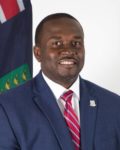Yesterday, Honorable Marlon A. Penn, Minister for Health & Social Development outlined a significant update to the British Virgin Island’s COVID-19 Protocols, which are set to be put into action this week. Beginning on Wednesday the 15th of June 2022, persons traveling to the BVI, regardless of vaccination status, will no longer need to register for entry clearance on the BVI Gateway Travel Portal, and will not be required to show proof of travel insurance.
which are set to be put into action this week. Beginning on Wednesday the 15th of June 2022, persons traveling to the BVI, regardless of vaccination status, will no longer need to register for entry clearance on the BVI Gateway Travel Portal, and will not be required to show proof of travel insurance.
Day-trippers – meaning travelers who had been away from the Territory for less than 24 hours, or persons remaining in the Territory for less than 24 hours – will no longer need to present a COVID-19 test result upon arrival.
All other travelers over the age of 5, regardless of vaccination status, will have the following entry requirements:
• Present a negative rapid antigen test, or rt-PCR test, taken up to 48 hours before entry.
• Alternatively, a person may present a document issued by a licensed medical professional certifying COVID-19 recovery within 90 days prior to arrival, in place of a negative test.
• If unable to present a test result, or a Recovery certificate, the person will be tested upon arrival in the Territory.
• A person who tests positive on arrival will be required to adhere to Ministry of Health protocols and instructions for COVID-19 positive persons.
These entry procedures will be kept under review to determine any changes to be made in the future.
It is important to bear in mind that all travelers entering the Territory will continue to be subject to COVID-19 screening, and anyone exhibiting signs of illness may be tested at the port of entry.
Cabinet also decided that, with effect from the 15th of June 2022, the wearing of face masks or face coverings, whether indoors or outdoors, will no longer be mandated by law, but will be allowed as a matter of choice in public spaces.
Even as this mask mandate is being lifted, any private establishment or service provider may institute its own policy on mask wearing. The same will apply to the Public Sector, and the Deputy Governor will develop a policy on the areas where mask wearing will still be required, such as in agencies providing health and social care, border protection services, and other front-facing departments where the risk of exposure is higher.

